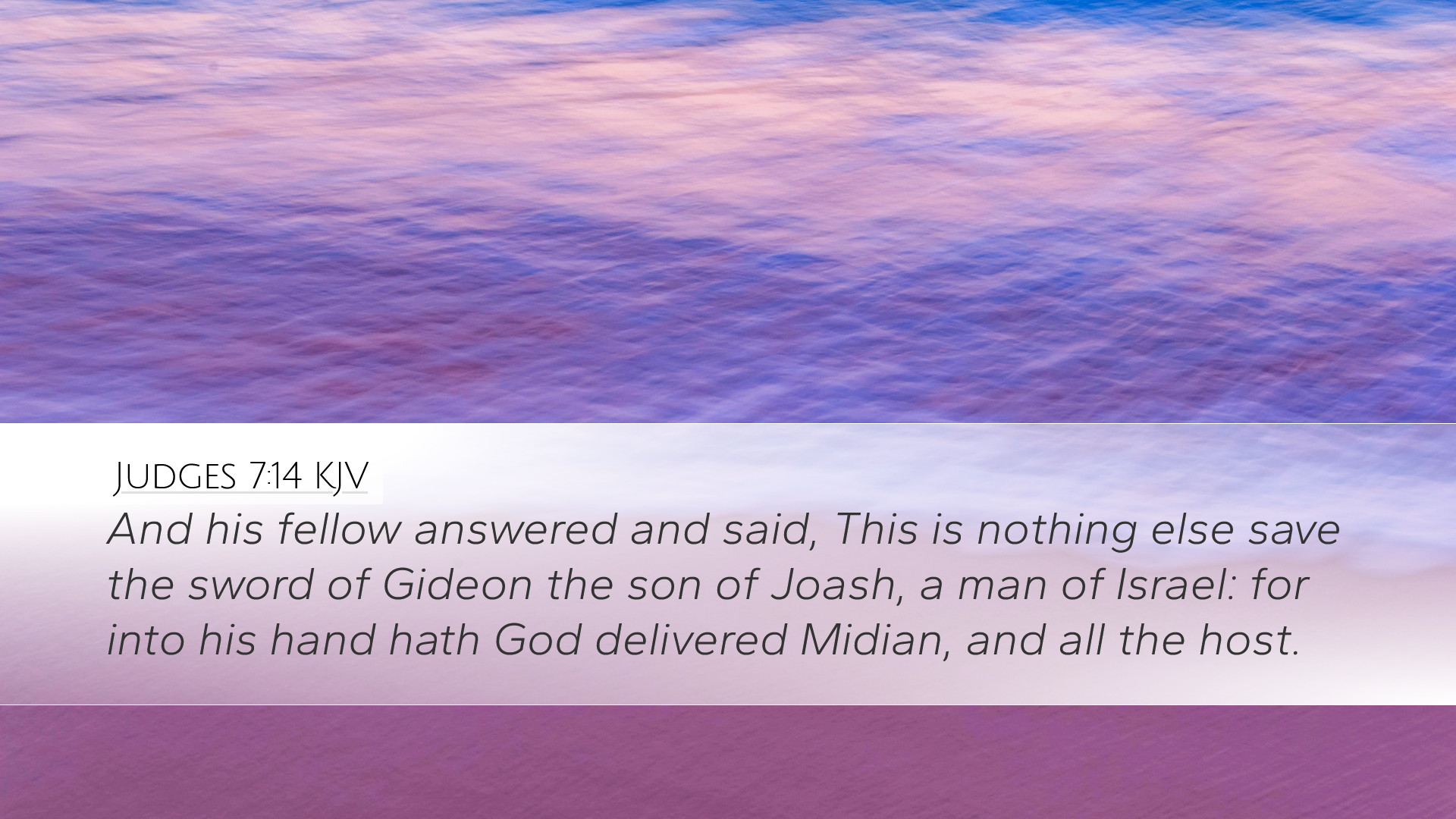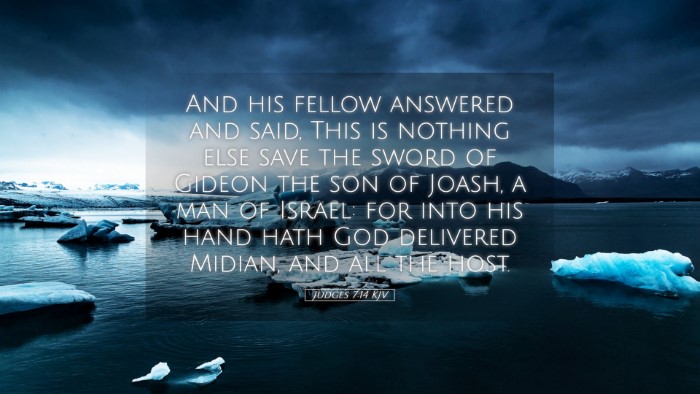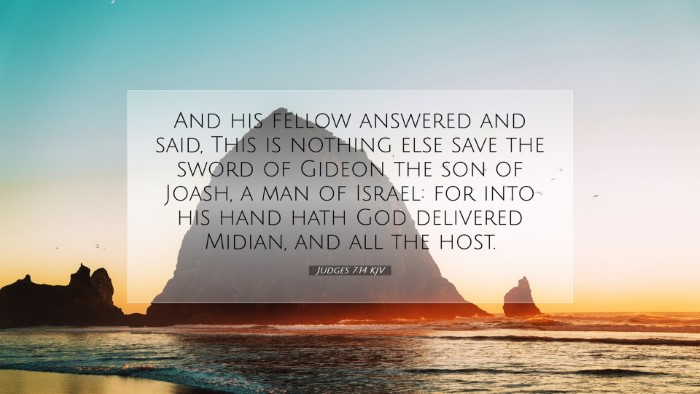Old Testament
Genesis Exodus Leviticus Numbers Deuteronomy Joshua Judges Ruth 1 Samuel 2 Samuel 1 Kings 2 Kings 1 Chronicles 2 Chronicles Ezra Nehemiah Esther Job Psalms Proverbs Ecclesiastes Song of Solomon Isaiah Jeremiah Lamentations Ezekiel Daniel Hosea Joel Amos Obadiah Jonah Micah Nahum Habakkuk Zephaniah Haggai Zechariah MalachiJudges 7:14
Judges 7:14 KJV
And his fellow answered and said, This is nothing else save the sword of Gideon the son of Joash, a man of Israel: for into his hand hath God delivered Midian, and all the host.
Judges 7:14 Bible Commentary
Judges 7:14 Commentary
Judges 7:14 states: "And his fellow answered and said, This is nothing else save the sword of Gideon the son of Joash, a man of Israel: for into his hand hath God delivered Midian, and all the host." This verse occurs during a pivotal moment in the narrative of Gideon, where divine intervention coincides with the psychological and spiritual landscape of Israel. Through the lens of several public domain commentaries, we can unpack the implications of this verse more thoroughly.
Contextual Overview
The context of Judges 7 details Gideon's call to deliver Israel from Midianite oppression. Prior to this moment, Gideon's army has been reduced from 32,000 to 300 men, highlighting God's power and purpose in using few against many. This verse encapsulates an affirmation of divine sovereignty, where a dream and its interpretation serve to bolster Gideon's courage.
Insights from Matthew Henry
Matthew Henry highlights the significance of the dream that one of the Midianite soldiers recounts, which reveals a perception of the impending doom that Gideon represents. The interpretation of the dream as Gideon’s sword means that the enemy recognizes the efficacy of God’s chosen leader. Here, Henry observes:
- Divine Providence: The Midianite soldier, upon hearing the dream, acknowledges it as a sign that God has granted Gideon victory, symbolizing God's sovereign control over Israel’s deliverance.
- Fear of God’s People: The fear among the Midianites reflects the efficacy of God's presence with Gideon, showcasing how the enemies of God are aware of His power at work in His people.
- Encouragement for Gideon: This interpretation acts as a means of encouragement for Gideon, emphasizing that despite his reduced forces, he is not alone; God fights alongside him.
Insights from Adam Clarke
Adam Clarke provides detailed analysis on the interplay of fear and hope in this passage. He emphasizes:
- Symbolic Interpretation: Clarke notes that Gideon's sword is emblematic of Israel's deliverance, implying that while the sword may belong to Gideon, the victory is ultimately God’s.
- Nature of Courage: He discusses how God instills courage not only in Gideon but in the hearts of the people listening, showcasing how collective faith is built upon understanding God's plan.
- Impact of Dreams: Clarke points out that dreams, as seen in this narrative, serve a profound role in biblical literature, often reflective of divine messages that guide and encourage leaders and nations.
Insights from Albert Barnes
Albert Barnes focuses on the Midianite perspective noted in this verse. His commentary provides insights such as:
- Recognition of Leadership: Barnes notes that the acknowledgment of Gideon as "the son of Joash" denotes not just personal identity but the line of authority that Gideon represents in leading Israel against their oppressors.
- Infallible Confidence: The confidence expressed by the Midianite in interpreting the dream is paramount. Barnes argues that it serves as both a recognition of Gideon’s authority and a manifestation of their own terror, which would be pivotal in the ensuing battle.
- Spiritual Warfare: Barnes emphasizes that this event is illustrative of spiritual truths—Gideon’s mission represents the state of Israel's walk with God, who empowers His leaders to overcome spiritual and physical adversaries.
Theological Reflections
This verse invites deep theological reflection on the nature of God's intervention in human history. The convergence of a dream—a common motif in biblical narratives—with the mission of Jesus’ forebear, Gideon, showcases important themes in theology. Some of these include:
- God's Sovereignty: The sovereignty of God is displayed through this divine dream, illustrating that He orchestrates events for the fulfillment of His promises to His people.
- The Nature of Leadership: Effective leadership in faith often requires reliance on God, as seen through Gideon, who stemmed his confidence from divine assurances rather than sheer numerical advantage.
- Faith in Adversity: The fear instilled in enemies reflects the transformative effect of faith—the kind that Gideon had to encourage in his own people, fostering bravery amid overwhelming odds.
Conclusion
In conclusion, Judges 7:14 serves not only as a historical account but as a rich source for understanding divine agency in the lives of believers. It highlights key principles that are still applicable for pastors, students, theologians, and scholars today. The interpretations provided by Matthew Henry, Adam Clarke, and Albert Barnes converge on the belief that God’s presence and control are paramount in victorious living, encouraging faith and courage against all odds.


